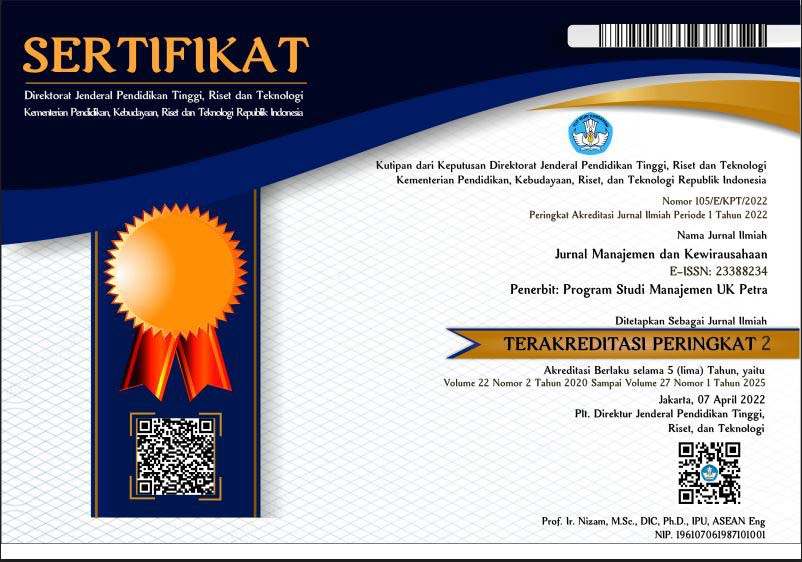IDENTIFYING MOTIVATION FACTOR INVOLVEMENT OF SARAWAK MALAY WOMEN ENTREPRENEUR
 :
:
https://doi.org/10.9744/jmk.18.1.54-59
Keywords:
Sarawak women, entrepreneur, cottage industries, motivation, challenges.Abstract
Sarawak multilayered cake among Sarawak product signature famous among the local as well as international tourist visiting Sarawak. In fact, Sarawak Malay women entrepreneurs have become very necessary players in the entrepreneurial field specifically in this cottage industries from the early introduction of this business, they have facing various problem in this businesses. Thus, this research aims to build an understanding of motivational factor that encourage Sarawak Malay women entrepreneurial experiences especially in multilayered cake businesses. Using qualitative methods, this research aims to identify the entrepreneurial motivations factors; with regards to start-up motivation by Sarawak Malay women. The finding shows that the motivations that influence Malay women within Kuching, Sarawak areas to start and grow their business are involve self-driven and context driven that motivate them involve in multilayered cakes businesses.References
Alam, S., Jani, M., & Omar, N. (2011). An empirical study of success factors of women entrepreneurs in southern region in Malaysia. International Journal of Economics and Finance, 3(2), 166–175.
Bender, S. (2000). Seven characteristics of the American women entrepreneur: A hermeneutic approach to developing a universal characteristic model. Unpublished doctoral dissertation, Capella University.
Buttner, H. & Moore, D. (1997). Women's organizational exodus to entrepreneurship: Self-reported motivations and correlates with success. Journal of Small Business Management, 35(1), 34–46.
Dzisi, S. (2008). Entrepreneurial activities of indigenous African women: A case of Ghana. Journal of Enterprising Communities: People and Places in the Global Economy, 2(3), 254–264
Fuad, N. & Bohari, A. (2011). Malay women entrepreneurs in the small and medium sized ictrelated business: A study on need for achievement. International Journal of Business and Social Science, 2(13), 272–279.
Ismail, C., Shamsudin, M., & Chowdury, M. (2012). An exploratory study of motivational factors on women entrepreneurship venturing in Malaysia. Business and Economic Research, 2(1), 1–14.
Jalbert, S. (2000). Women entrepreneurs in the global economy. Center for International Private Enterprise.
Johari, D. (2014). An investigation using rfid in small medium industries (smi) in Sarawak (Kek Lapis). Unpublished dissertation, Master of Engineering, Faculty of Mechanical and Manufacturing Engineering, Universiti Tun Hussein Onn Malaysia.
Kasuma, J. (2012). The effects of ethnicity and religiosity on loyalty of micro-enterprise owners' toward banks. an application in Malaysia. Unpublished doctoral dissertation, Toulouse University.
Kasuma, J, Yacob, Y., Bullok, C. G., & Hossen, R. (2015). Determinants of women involvement in Sarawak cooperative movement. Global Journal of Business and Social Science Review, 4(1), 135 –142
Kavitha, R., Anantharaman, R., & Sharmila, J. (2008). Motivational factors affecting entrepreneurial decision: A comparison between Malaysian women entrepreneurs and women non entrepreneurs. Communications of the IBIMA, 2, 85–89.
Lavoie, D. (1985). A new era for female entrepreneurship in the 80's. Journal of Small Business, 2(3), 34–43.
Lee, M., & Rogoff, E. (1997). Do women business owners require special training? An empirical comparison of men and women business owners in the United States. Journal of Small Business and Entrepreneurship, 14(1), 4–29.
Mohd. Yunus, J. & Mahajar, A. (2012). Factors that encourage women involvement in smes in Pahang, Malaysia. The Journal of Human Resource and Adult Learning, 8(2), 33–41.
Nelson, O. & Cengiz, K. (2006). Malaysian women entrepreneurs: Understanding the ict usage behaviors and drivers. Journal of Enterprise Information Management, 18, 721–739.
Robertson, M., Collins, Medeira, A., & Slatter, J. (2003). Barriers to startup and their effect on aspirant entreprenurs. Education and Training, 45(6), 308–316.
Sarri, K. & Trihopoulou, A. (2005). Female entrepreneurs' personal characteristics and motivation: A review of the Greek situation. Women in Management Review, 20(1), 24–36.
Schwartz, E. (1976). Entreprenurship: A new female frontier. Journal of Contemparary Business, 5(1), 47–76.
Scott, C. (1986). Why more women are becoming entrepreneurs. Journal of Small Business Management, 24(4), 37–44.
Selamat, N., Razak, A., & Gapor, A. (2011). Survival through entrepreneurship: Determinants of successful micro-enterprises in Balik Pulau, Penang Island, Malaysia. British Journal of Arts and Social Sciences, 3(1), 23–37.
Sexton, D. (1980). Characteristics and role demands of successful entrepreneurs. Paper presented at the meeting of the Academy of Management. Detroit.
Corbin, J. & Strauss, A. (2008). Basic of qualitative research: Techniques and procedures for developing grounded theory. Newbury Park, CA: Sage Publications.
Teoh, W. M. & Chong, S. (2007). Theorising a framework of factors influencing performance of women entrepreneurs in Malaysia. Journal of Asia Entrepreneurship and Sustainability, 3(2), 1–17.
Woldie, A. & Adersua, A. (2004). Female entrepreneurs in a transitional economy: Business women in Nigeria. International Journal of Social Economics, 31(1/2), 78–90.
Downloads
Published
How to Cite
Issue
Section
License
Authors who publish on this journal agree to the following terms:
- Authors retain copyright and grant the journal right of first publication with the work simultaneously licensed under a Creative Commons Attribution License that allows others to share the work with an acknowledgement of the work's authorship and initial publication in this journal.
- Authors are able to enter into separate, additional contractual arrangements for the non-exclusive distribution of the journal's published version of the work (e.g., post it to an institutional repository or publish it in a book), with an acknowledgement of its initial publication in this journal.
- Authors are permitted and encouraged to post their work online (e.g., in institutional repositories or on their website) prior to and during the submission process, as it can lead to productive exchanges, as well as earlier and greater citation of published work (See The Effect of Open Access).

















